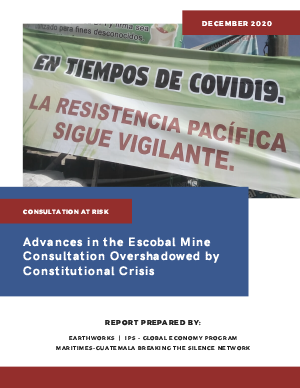More than two years after the court ordered a consultation with the Xinka Indigenous people over the future of the Escobal silver mine, the process has yet to move beyond the first stage. Political and constitutional crises, as well as Pan American Silver’s ongoing community relations activities, pose a further risk to its continuation.

After two years of setbacks, the Ministry of Energy and Mines (MEM) only recently accepted the 59 Xinka representatives elected to participate in the consultation, the government’s first meaningful recognition of the legitimacy of the Xinka’s traditional decision-making structure. However, serious obstacles to the success of the process remain. According to a new report: Advances in Escobal Mine Consultation Overshadowed by Constitutional Crisis in Guatemala, political and constitutional crises, as well as the company’s continued interference locally, threaten the spirit, integrity and legality of the consultation.
In recent weeks, widespread protests against government corruption have rocked the country, as citizens call for the resignation of President Alejandro Giammettei and key members of his cabinet. Cause for citizen outrage ranges from the mismanagement of COVID-19 relief funds to the brazen infiltration of corrupt groups in the country’s most important institutions, including the Supreme Court and the Constitutional Court.
The erosion of judicial independence in Guatemala has serious implications for the country as a whole, but also specifically for the consultation with the Xinka. The 2018 Constitutional Court decision named the Supreme Court’s role as the main arbiter for the process. Without an independent and impartial Supreme Court, there is no institutional backstop to ensure that Xinka rights are upheld and that the consultation is carried out in accordance with international standards. As a result, the Xinka face an uphill battle as they fight for a meaningful consultation and the right to determine their own future and that of the Escobal mine.
Further complicating the situation are Pan American Silver’s ongoing community programs, which the Xinka Parliament have denounced as violating the court-ordered suspension of the mine. According to the Xinka Parliament, the company is using the COVID-19 pandemic to expand outreach at the community level, increasing tension and conflict between communities willing to receive aid from a transnational mining company and those who are not.
Read more about the situation in Guatemala, including an uptick in threats against Xinka leaders and members of the Peaceful Resistance and ongoing challenges associated with the global health pandemic.
For More Information
- Report: Consultation at Risk: Advances in Escobal Mine Consultation Overshadowed by Constitutional Crisis in Guatemala – Dec 21 2020
- Earthblog: Xinka Parliament Announces Consultation Breakthrough in Mine Consultation Process – Oct 27 2020
- Earthblog: Tough questions and no answers from Pan American Silver – May 8 2020
- Report: Guatemalan government discriminates against Xinka, puts Escobal mine consultation at risk – Sep 12 2019

